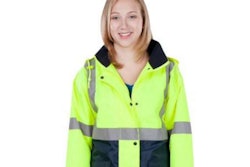What’s the truth about women in the U.S. trucking industry?
A panel discussion at the recent Great American Trucking Show in Dallas actually found several:
- Some women have issues with the design of trucks
- Others are concerned with the amount of home time they have
- Many worry about finding adequate, safe parking
- Most don’t want any special treatment by their employers or shippers and receivers
- All want to be respected for what they do
 Women trucking panel members (from left) Ellen Voie, Sylvia Heinrch, Linda Longton, Mark Willis & Tim Aschoff.
Women trucking panel members (from left) Ellen Voie, Sylvia Heinrch, Linda Longton, Mark Willis & Tim Aschoff.Those were among the topics covered by the panel discussion organized by Crete Carrier and moderated by Jessica Byrne.
Panel members included:
- Crete driver/trainer Silvia Heinrich
- Crete COO Tim Aschoff
- Randall-Reilly VP for Editorial and Research Linda Longton
- Women in Trucking President and CEO Ellen Voie
- Sirius XM Radio’s Road Dog Radio’s Mark Willis
“Women don’t want to be treated differently,” said Longton, adding that women go into the profession “with eyes open” and understand the reality of joining a male-dominated field.
When it comes to home time, it’s all about what works for the individual. Some women, like men who drive, want to be home every day while others are happy being out for a month at a time.
Heinrich said she is home once a month, and that suits her just fine.
Aschoff believes the answer is to provide sufficient options to suit individual drivers. He said his company created a flexible structure that offers opportunities for drivers to be home once or twice a week, every seven days, every 14 days or every 21 days.
“We try to find out what works for each individual,” said Aschoff.
Willis said fleets are also trying to show women there are opportunities outside the cab as well. They have more women in various office positions and in management spots
Voie pointed out a concern WIT has pursued is truck cab design. She said many women are smaller than men and would like seats designed to make it easier to reach the truck’s pedals. Others, according to Voie, have suggested that steps and hand rails be adjusted to better accommodate women, and an alarm that could be triggered in case of an emergency could be added.
She added that WIT is advocating with OEMs for such changes and urges fleets to spec more trucks with their women drives in mind.
Safety is especially important for women drivers when it comes to parking.
Longton said women are especially aware of their surroundings when at a truck stop. She said a recent survey of women drivers performed by Randall-Reilly found that access to safe, well-lit parking is a primary concern of women drivers. She said some drivers said they have a dog that rides with them to enhance their safety on the road.
Aschoff said all three major truck stop companies are focused on the issue of providing sufficient parking.
Heinrich said she always looks for the safest place to park when she stops, and talks on the phone with someone when walking between her truck and the truck stop building.
The image of the industry also needs work if it wishes to attract more women.
Longton said Overdrive’s annual “Most Beautiful” competition is meant to show that the field is not just for “big, burly men.”
Voie added that WIT has worked to create a trucking-related merit badge for Girl Scouts, to help show trucks are for girls as well.
In the end, Aschoff said it’s all about respect.
“Everyone wants to be treated with respect,” he said. “We need to treat each other with the respect we (ourselves) would want.”










